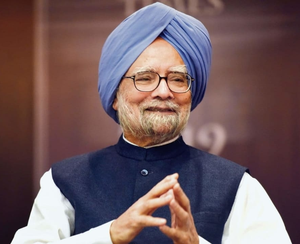The Central government is likely to announce seven days of national mourning as a mark of respect to former Prime Minister Manmohan Singh who died at the age of 92 here on Thursday, according to sources.
Sources said that the last rites of the former Prime Minister will be conducted with full state honours.
It has been learned that all government programmes scheduled for Friday will be cancelled and the Union Cabinet would hold a meeting at 11 a.m., sources said.
The National Flag will be flown at half-mast on the days of mourning throughout India on all buildings where it is flown regularly and there will be no official entertainment on the days during the period of national mourning.
The news of Dr. Singh's demise was confirmed by AIIMS New Delhi.
"With profound grief, we inform the demise of former Prime Minister of India, Dr. Manmohan Singh aged 92. He was being treated for age related medical conditions and had sudden loss of consciousness at home on December 26. Resuscitative measures were started immediately at home. He was brought to the medical emergency at AIIMS. Despite all efforts, he could not be revived and was declared dead at 9.51 p.m.,” said the hospital in a statement.
Dr. Singh, who served as the country's Prime Minister from 2004 to 2014, was known for his transformative role in steering India’s economy through a period of significant liberalisation.
He is survived by his wife, Gursharan Kaur, and their three daughters. Funeral arrangements are expected to be announced soon, with the nation’s leaders, including Prime Minister Narendra Modi, expected to participate in honouring his memory. Dr. Singh's death marks the end of an era in Indian politics. His leadership and legacy will continue to inspire future generations.
In April this year, Manmohan Singh retired from Rajya Sabha, with Congress President Mallikarjun Kharge praising his long parliamentary career.
Manmohan Singh shot to prominence as the country's Finance Minister in the government headed by P.V. Narasimha Rao during 1991-96, having brought in sweeping reforms that transformed the economy.
